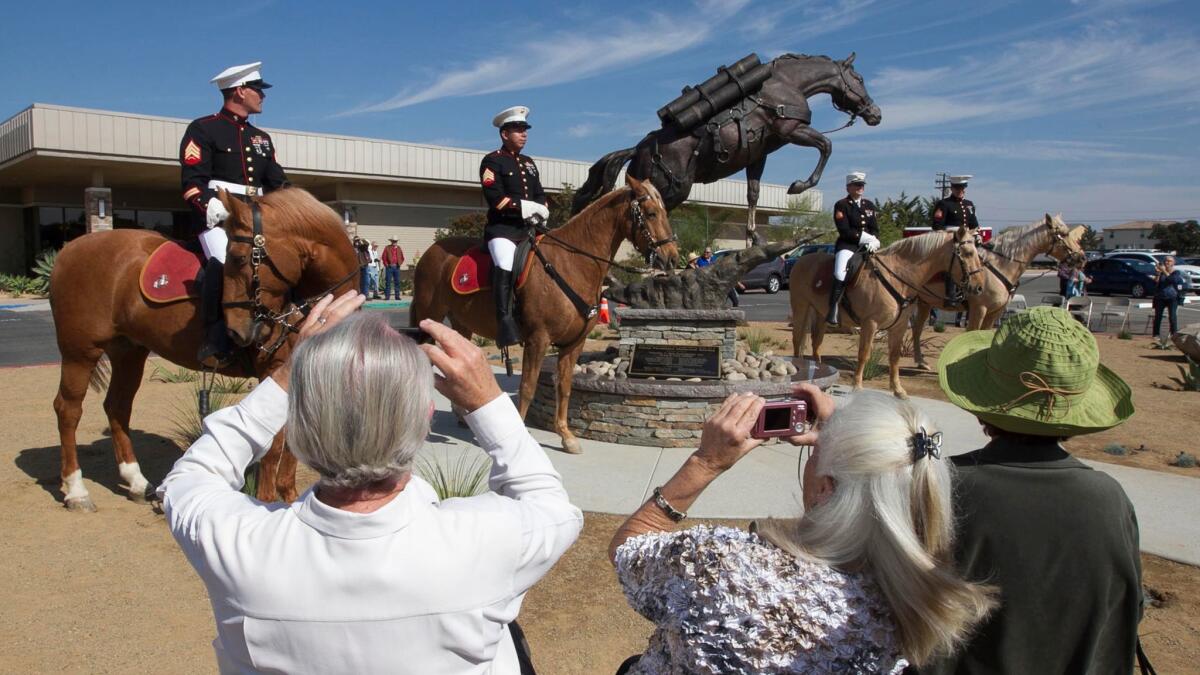Reckless, a hero horse for the Marines, honored with a statue at Camp Pendleton

- Share via
Reckless wasn’t just a horse. She was a U.S. Marine.
The hero horse who shed blood alongside fellow Marines in the Korean War was honored with a statue at Camp Pendleton this week.
The mare known as Staff Sgt. Reckless was famous during the Korean War era, equal to Lassie or Rin Tin Tin. But her story has largely faded from popular memory.
A Los Angeles-area screenwriter is trying to revive it through a 2014 book and a now-successful campaign to erect a larger-than-life bronze likeness of Reckless at Camp Pendleton, where she lived out her retirement years.
“I thought this is the greatest horse story I had never heard about,” said Robin Hutton, who wrote “Sgt. Reckless, America’s War Horse” and led a three-year effort to raise funds for the Camp Pendleton statue. She’s shopping the concept to movie studios as well.
Hutton sees Reckless as a way to teach the history of the Korean War — often called the “forgotten war” — whose veterans are now dwindling in number.
A few dozen white-haired Marine survivors of Korea gathered at Camp Pendleton to honor their comrade in arms — or, actually, hooves.
“Horses and Marines are a lot alike,” said Harold Wadley, who served with Reckless and traveled to Wednesday’s ceremony from his home in Idaho.
“They both are herd animals requiring leadership,” Wadley said. “The main difference is that horses instinctively flee from danger, and Marines run toward it.”
It was an unlikely war story.
In late 1952, a young lieutenant with the 5th Marine Regiment received permission to buy a pack animal — maybe a mule, maybe a horse — to carry heavy ammunition to his Marines on the firing line.
1st Lt. Eric Pedersen returned with a small Mongolian mare, bought for $250 at a racetrack from a South Korean youth who needed the money for his sister’s medical care.
The horse, named Reckless after the recoil-less rifle platoon she was attached to, proved her worth beyond price. She learned to duck beneath barbed wire, lay flat if caught under fire on open ground and run for her bunker whenever artillery or mortars came flying.
A horse without a herd, she bonded with those Marine grunts.
“Cold winter nights, you’d find her nestled among her Marines by the oil stove,” Wadley said.
Reckless’ main job was transporting shells for the 75mm rifle, a large weapon more like today’s mortars. Each shell weighed more than 20 pounds. The Marines tied four to six rounds to her back for each trip.
With a slap on the flank, Reckless headed off to the front line, often solo.
In March 1953, the enemy overran the company’s location, Outpost Vegas. Reckless was credited with making 51 trips to resupply the guns during pitched battle.
She carried 386 rounds totaling more than 9,000 pounds and trekked over 35 miles up and down steep ridges. The horse also transported wounded Marines back from the front. Wadley remembers the scene.
“It was like the sky was falling. … I didn’t have near enough stretchers,” he said.
Reckless didn’t shy away from her mission. She knew where her Marines were.
“I looked back at the eastern skyline through all the smoke and could hardly believe my eyes,” Wadley recalled Wednesday. “The silhouette of a heavily laden horse came in and out of view along the ridge. It was Reckless. All alone, scrambling in the torn earth to keep her footing.”
The mare was wounded twice — on the forehead and in the hindquarter. She later received the Purple Heart. Wadley said he sees more than a horse carrying ammunition when he looks at the new statue in front of the base’s Pacific Views Events Center.
That kind of horse deserves a statue. Or two.
The first was erected in 2013 at the Marine Corps Museum in Quantico, Va.
The Camp Pendleton version — by the same artist, Jocelyn Russell — stands about 12 feet high. It cost $185,000; most of the money was raised through donations to the Camp Pendleton Historical Society and Hutton’s Angels Without Wings nonprofit.
Reckless’ story almost didn’t have a happy ending, Hutton said.
The mare stayed behind in Korea after the fighting ended. It took an article in the Saturday Evening Post to generate enough public sentiment to bring her to the United States.
Eventually, Reckless was billeted at Camp Pendleton’s stables.
The mare gave birth to three colts. They were named Fearless, Dauntless and Chesty — the last an homage to Marine Corps icon Chesty Puller, a fellow Korean War veteran.
Reckless died in May 1968. She was buried at the base stables with full military honors. Her obituary made the front page of the San Diego Union.
Her memorial plaque reads, “Reckless. Pride of the Marines.”
Steele writes for the San Diego Union-Tribune.
More to Read
Sign up for Essential California
The most important California stories and recommendations in your inbox every morning.
You may occasionally receive promotional content from the Los Angeles Times.










